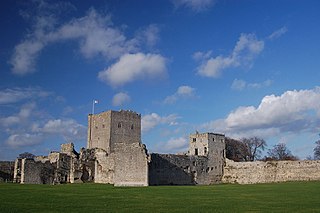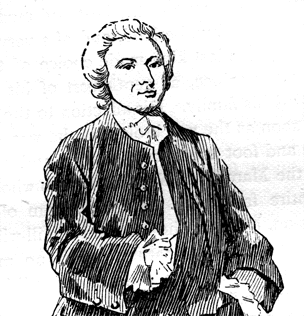See also
| This page lists people with the surname Widdrington. If an internal link intending to refer to a specific person led you to this page, you may wish to change that link by adding the person's given name(s) to the link. |
Widdrington is a surname, and may refer to:
| This page lists people with the surname Widdrington. If an internal link intending to refer to a specific person led you to this page, you may wish to change that link by adding the person's given name(s) to the link. |

Lord William Howard was an English nobleman and antiquary, sometimes known as "Belted or Bauld (bold) Will".
This is a list of people who have served as Lord Lieutenant of Durham.
Thomas Hickman-Windsor, 1st Earl of Plymouth, PC was the son of Dixie Hickman and his wife Elizabeth Windsor, sister and heiress of Thomas, 6th Baron Windsor. He assumed the additional surname of Windsor and succeeded to the Windsor family's estate around Hewell Grange near Redditch in 1645. The same year he distinguished himself in the Battle of Naseby. Hickman-Windsor impressed King Charles I by relieving his garrison at High Ercall.
William Widdrington, 1st Baron Widdrington was an English landowner and politician who sat in the House of Commons from 1640 to 1642 and was created a peer in 1643. He fought in the Royalist army in the English Civil War and was killed in battle in 1651.

Blankney is a village and civil parish in the North Kesteven district of Lincolnshire, England. The population of the civil parish at the 2011 census was 251. The village is situated approximately 9 miles (14 km) south from the city and county town of Lincoln and 9 miles north from Sleaford.

Sir Thomas Grey, of Heaton Castle in the parish of Norham, Northumberland, was one of the three conspirators in the failed Southampton Plot against King Henry V in 1415, for which he was executed.
This is a list of people who have served as Custos Rotulorum of Northumberland.

Baron Widdrington, of Blankney in the County of Lincoln, was a title in the Peerage of England. It was created on 2 November 1643 for Sir William Widdrington, 1st Baronet. He had already been created a baronet, of Widdrington in the County of Northumberland, in the Baronetage of England on 9 July 1642. The Widdringtons were an ancient Northumbrian family who gave their name to the village, near Morpeth, Northumberland. In the 17th century the family were strongly Royalist. William Widdrington, 4th Baron Widdrington, joined Derwentwater and other Northumberland families in the Jacobite rising of 1715 and was captured at the Battle of Preston (1715). As a consequence of the subsequent attainder of the brothers, the Widdrington estates were sequestered and sold by the Crown, and the title was forfeited. Of their three great houses no traces now remain: Widdrington Castle was demolished in 1862 ; Stella Hall, Blaydon on Tyne, was demolished in 1954; and Blankney Hall, Lincolnshire suffered the same fate in 1960. Some of the family paintings passed to the Cook/Widdrington family of Newton Hall, and those were auctioned by Christie’s in 2010. The important collection of family portraits passed into the possession of the Towneley family through Mary Widdrington, daughter of the third Baron. These were sold at various auctions after Towneley Hall was emptied in about 1902. A few have since been donated to Towneley Hall, and four were donated to Stonyhurst College in the 19th Century.

William Widdrington, 4th Baron Widdrington, was an English Roman Catholic peer and supporter of the Stuart claim to the Crown.

Sir Thomas Widdrington SL was an English judge and politician who sat in the House of Commons at various times between 1640 and 1664. He was speaker of the House of Commons in 1656.
Ralph Widdrington was Regius Professor of Greek at Cambridge University.
Ralph Widdrington was one of eight sons of William Widdrington, 1st Baron Widdrington and Mary Thorold.
William Widdrington may refer to:
There have been three baronetcies created for members of the Widdrington family, one in the Baronetage of Nova Scotia and two in the Baronetage of England. All three creations are extinct. The Widdringtons were an ancient Northumbrian family who gave their name to the village, near Morpeth, Northumberland. In the 17th century the family were strongly Royalist and were rewarded with one baronetcy in the Baronetage of Nova Scotia and two in the Baronetage of England. William Widdrington was created a baronet, of Widdrington in the County of Northumberland, in the Baronetage of England on 9 July 1642. For more information on this creation, see Baron Widdrington. His cousin Edward Widdrington was created a Baronet, of Widdrington in the County of Northumberland, in the Baronetage of Nova Scotia on 26 September 1635, and a Baronet, of Cartington in the County of Northumberland, in the Baronetage of England, on 8 August 1642. The Nova Scotia baronetcy became either extinct or dormant on his death in 1671 while the English baronetcy became extinct.
Lieutenant-General Thomas Windsor, 1st Viscount Windsor, styled The Honourable Thomas Windsor until 1699, was a British Army officer, landowner and Tory politician who sat in the English and British House of Commons between 1685 and 1712. He was then elevated to the British House of Lords as one of Harley's Dozen.
Charles Fairfax, 5th Viscount Fairfax of Emley, was an English peer.
Maria (Mary) Winifreda Francisca Howard, Duchess of Norfolk was an English Catholic noblewoman, the last of the wealthy Shireburn family. She married twice, firstly to Thomas Howard, 8th Duke of Norfolk from whom she became estranged before his death and secondly to Peregrine Widdrington. She built a house in London on Arlington Street, which today is the clubhouse of the Royal Over-Seas League.
Brigadier-General Andrews Windsor (1678–1765), of Southampton, was a British Army officer and politician.

Widdrington is a village and a civil parish in the county of Northumberland, England. It borders Tritlington and West Chevington and East Chevington parishes to the north, the North Sea to the east, Cresswell and Ellington and Linton parishes to the south, and Widdrington Station and Stobswood parish to the west.